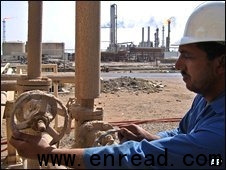| ||||||||||||||||||||||||||||||||||||||||||||||||||||||||||||||||||||||||||||||||||||||||||||||||
|
Iraq's cabinet has ratified1 a deal with two foreign energy companies to develop the giant southern oilfield in Rumaila. 伊拉克内阁核准了与两家外国能源公司在南部鲁迈拉大油田进行开采的协议。  The Rumaila project aims to increase output at the field by 2m barrels a day The contract with Britain's BP and CNPC of China is the first major deal with foreign firms to be signed since an international auction2 in June. The project aims to almost triple output at the 17bn barrel field - increasing it by 2m barrels a day. Iraq has the world's third largest oil reserves, but production lags behind potential due to a lack of investment. The country's total daily output of 2.4m barrels is lower than it should be due to problems stemming from sanctions against former Iraqi governments, lack of investment and insurgent3(叛乱的) attacks, analysts4 say. Thirty two companies - including Shell, Exxon, BP and Total - bid for contracts to develop six oil fields and two gas fields in June's televised auction, Iraq's first big oil tender(提供,投标) since the invasion of 2003. But most of the bidders withdrew at the last moment, saying the terms on offer were unfavourable. BP and CNPC agreed to run the Rumaila field - near the southern city of Basra - after US giant Exxon Mobil turned it down. Iraq's oil ministry6 offered 20-year service contracts on the field, stipulating7(规定,明定) that companies would not be paid anything until a minimum level of production - close to the amount currently being produced - was reached. Above that point, the companies would be paid a certain amount per barrel up to a maximum level stipulated8 by the ministry. The maximum amount being offered by the ministry in the case of the Rumaila field was significantly less than the oil companies were asking for. Exxon Mobil declined to accept the maximum payment, but BP and CNPC, which had originally asked for $4 a barrel, agreed to do the work for $2 a barrel. They will also be able to charge the ministry for the costs of the work they have to do on the production facilities. Questions over approval Iraq's oil laws are still vague(模糊的,含糊的) and many foreign companies remain wary9 of(谨慎的) investing in Iraq's energy sector10, says the BBC's Gabriel Gatehouse in Baghdad. The Iraqi government has urged the companies involved in June's auction to resubmit their bids. But questions remain over who exactly has the authority to approve such contracts, our correspondent says. Many companies fear politics could get in the way of business, especially with parliamentary elections looming11 in January. BP was thrown out of Iraq in 1972 when Saddam Hussein nationalized the oil industry. The British company will hold a 38% stake in the venture, compared to CNPC's 37% share, while Iraq's State Oil Marketing12 Organization will control the remaining 25%, the Associated Press reported. The fields up for auction in June contained about 43bn barrels of Iraq's proven oil reserves of 115bn barrels. 点击  收听单词发音 收听单词发音
|
||||||||||||||||||||||||||||||||||||||||||||||||||||||||||||||||||||||||||||||||||||||||||||||||
- 发表评论
-
- 最新评论 进入详细评论页>>



